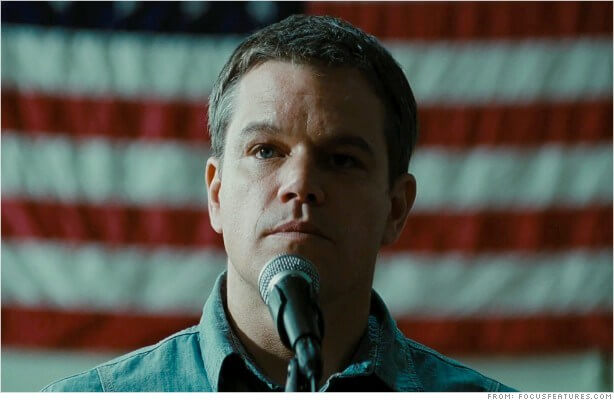 PROMISED LAND
PROMISED LAND
Focus Features, Rated R
3 stars
Economic crisis cinema meets ecology noir in the subdued yet strangely disturbing Gus Van Sant mockudrama, Promised Land. With a title meant as anything but, this quite clandestine corporate crime thriller takes its time unfolding in deliberate, at times exasperating slow motion. As if reserving anxious quiet time for audience introspection about looming critical issues in the present moment.
Matt Damon, who collaborated on the screenplay with co-star John Krasinski, stars in Promised Land as Steve Butler, a salesman in the field for a corporate domestic gas pipeline drilling company. Butler is currently caught between the contradictions of rationalizing the communal small town values of his rural Iowa roots, and the ego fulfillment of a mega-company promotion he’s just received. Owing to his talent for manipulating economic crisis ridden farmers into selling their land for dangerous gas fracking beneath. Which will in turn rescue them from financial doom, but ultimately ruin the farmland and spread disease and death among the animals and human inhabitants.
Along for the ride on their latest assignment in coaxing a town of vulnerable Pennsylvania farmers to essentially do the wrong thing, is Butler’s manic corporate partner in crime, Sue Thomason (Frances McDormand). Less driven than Butler to corral the locals as a personal career advancement move, Thomason is a working mom with her own financial issues, and substantially focused on feeding her family instead.
And there is little resistance to this Faustian bargain in progress. Which is vocalized most prominently but barely heeded – in dire warnings conjuring repercussions as looming inconvenient truths – on the part of respected retired school teacher and trained scientist, Frank Yates (Hal Holbrook). That is, until the worst nightmare of the corporate energy business turns up – an ecological-minded activist. Dustin Noble (John Krasinski) appears to be an unusual sort of environmental protester, a one man nomadic operation following fracking sales reps like Butler and Thomason around the country, to expose the harm they pose to the populations they are targeting. And with his youthful passion and perseverance for environmental causes, Butler faces a formidable adversary.
Promised Land, with its multiple ironic meanings pertaining as well to the absence of guarantees under the dominance of a fragile and frequently fraudulent economy, may frustrate audiences with its conception as much as a mirror as movie screen. And sidestepping any Hollywood happy endings in favor of sobering audience reflections on the way things are, and don’t necessarily have to be. In other words for a change in the way dramatic features are made – we direct, you decide.
DJANGO UNCHAINED
The Weinstein Company, Rated R
2 stars
While poetic license may serve as a liberating creative tool for a filmmaker channeling recorded history through a movie, recklessly navigating that vehicle, license or not, is debatable. And such could not be more the case with the down ‘n dirty Old Dixie road movie, Quentin Tarantino’s Django Unchained.
Whether Django Unchained is a slavery slapstick spaghetti western or merely pulp fiction playing dress-up in Confederacy duds, that seems to be beside the point. With a tone that shifts abruptly and often between grim and ludicrous, whatever sanctity related to the horrific history of black bondage in this country seeps out of this story as rapidly as the deluge of blood and projectile guts from the endless bullet riddled bodies.
Jamie Foxx is the Django in question – no relation except perhaps as homage to Franco Nero’s turn as the Italian badass cowboy of the same name in Sergio Corbucci’s 1966 original. (And Nero does make a cameo appearance in the wacko insular Tarantino universe here). Shackled to a slave chain gang being led across the Texas wilderness several years before the Civil War, Django is violently freed from bondage by Dr. King Schultz (Christoph Waltz), a German immigrant and itinerant dentist turned bounty hunter on the sly.
But Schultz harbors an ulterior motive for rescuing Django from captivity, namely the now ex-slave’s usefulness in tracking down his former owners, who happen to have a substantial bounty on their heads. And Django agrees to work for Schultz, if the bounty hunter in turn helps him locate his wife Broomhilda (Kerry Washington), who had been cruelly sold away by the slave owners.
And in the course of their odd couple journey through the Southern slavocracy that is more a concoction inside Tarantino’s head than anything else, scenes of racial brutality alternate with a ‘just kidding’ sense of casual humor. And that tends to trivialize whatever horror came before.
While oddly enough – Leonardo DiCaprio’s cartoonish plantation potentate villain Calvin Candie aside – visualizing an idyllic South that could have been ironically crafted by a filmmaker with Confederacy nostalgic tendencies instead. Including stylishly attired compliant, when outright conspiratorial with the Massa slaves (Samuel Jackson) happily prancing about the grounds, and women among them eagerly serving as seductive bordello babes on the premises.
All possibly revealing a lot less about the Old South, than the sugar coated present where reality is layered over with cruelty and violence for laughs, and whatever sells rather than signifying a case for sober reflection. And history, along with moviemaking, that gets a makeover under the dominant commercial imperatives of infotainment.



























